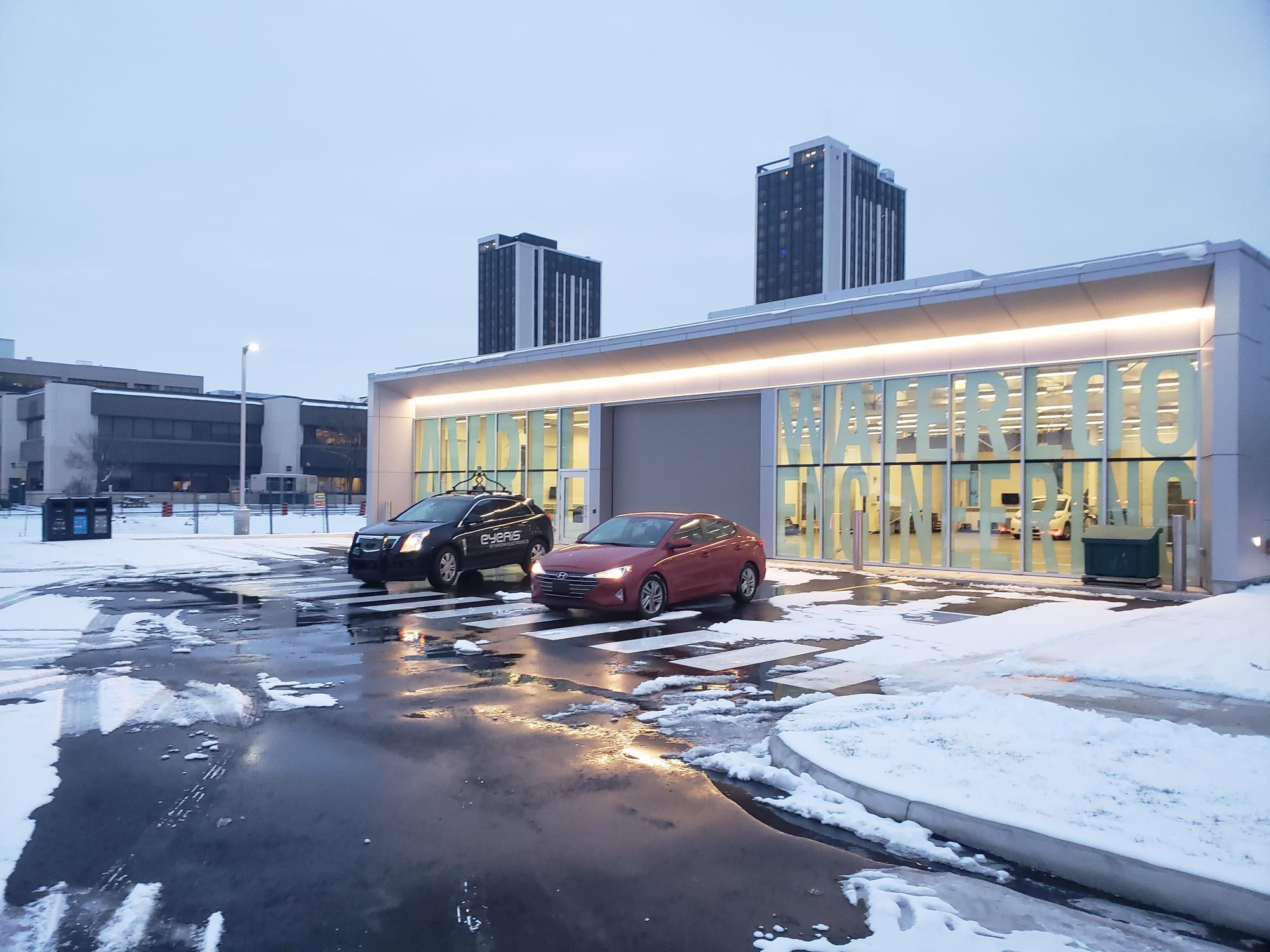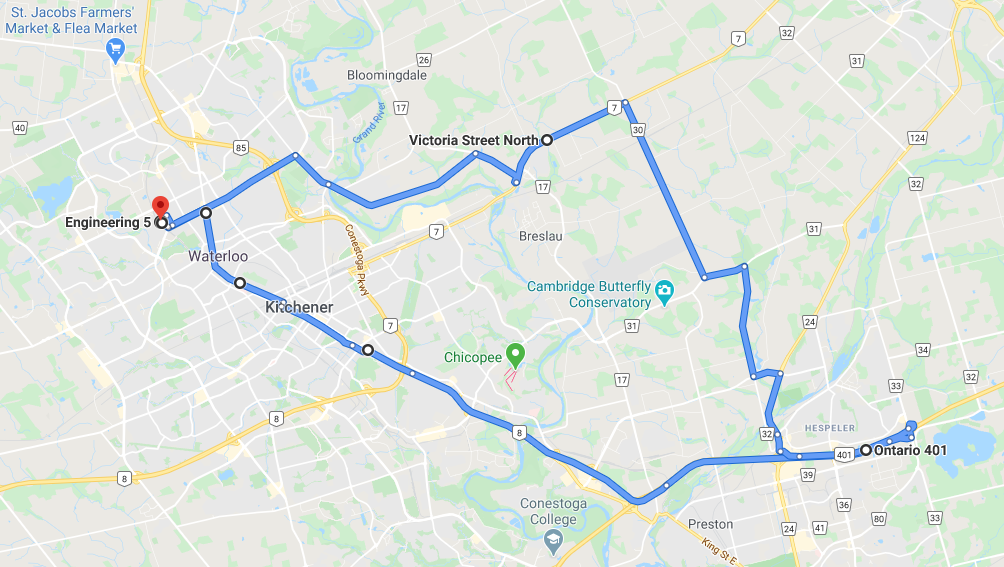About this Study (no longer active)
Note: this study has completed and the results are being analysed and calculated. Parts of the dataset may be released in the future for community use, thank you for your interest.
 The Real-Time Embedded Software Group and UWECEML labs at the Department of Electrical and Computer Engineering at the University of Waterloo are working to conduct a study on driving behaviour. This project is part of a research collaboration between the University of Waterloo and Magna International Inc. to develop a driving model for self-driving vehicles based on learning from human driver behaviour on roads using a variety of automotive sensors, data fusion and artificial intelligence algorithms. The goal is to create a comfortable in-vehicle experience when a self-driving mode is engaged. The project requires monitoring and recording the driving behaviour of 100 drivers using a specially equipped SUV (LiDAR, Radar, Cameras and more) in order to have sufficient data to create a self-learning model using machine learning algorithms.
The Real-Time Embedded Software Group and UWECEML labs at the Department of Electrical and Computer Engineering at the University of Waterloo are working to conduct a study on driving behaviour. This project is part of a research collaboration between the University of Waterloo and Magna International Inc. to develop a driving model for self-driving vehicles based on learning from human driver behaviour on roads using a variety of automotive sensors, data fusion and artificial intelligence algorithms. The goal is to create a comfortable in-vehicle experience when a self-driving mode is engaged. The project requires monitoring and recording the driving behaviour of 100 drivers using a specially equipped SUV (LiDAR, Radar, Cameras and more) in order to have sufficient data to create a self-learning model using machine learning algorithms.
Call for Participants
We are currently recruiting participants for this study.
As a participant in this study, you would be asked to drive a vehicle on a predefined route for 3 hours (including rest and refreshment breaks), where onboard vehicle sensors will record vehicle and driver information. This route will involve city, highway, and rural road driving.
Your participation would involve 1 session, which will take approximately 4 hours to complete. In appreciation of your time, you will receive $12.50 per hour, for a total of $50 if you complete the driving route and return the vehicle to the starting point. If you choose to withdraw from the study prior to completion, you will be remunerated at the hourly rate.
To be eligible to participate in this study, you:
- Must be under the age of 70.
- Must have a valid G license or equivalent (can drive unaccompanied).
- Must not have received a traffic ticket in the past 3 years.
- Must not have been in an accident as a driver in the past 5 years.
- Must drive a minimum of 1000 km per year.
- Must be comfortable with driving a mid-sized SUV in a variety of different conditions.
To volunteer for this study, please fill out the screening questionnaire.
Study Route
The study will take place along the following route (barring changes due to construction or traffic).

FAQ
Q: How will I know if I am selected for this study?
A: First, you must complete the screening questionnaire. If you meet the criteria for participation, an invitation will be sent to the email provided in section 1 of the questionnaire. The email will contain a link to a scheduling system so you can select your preferred time slot.
Q: As a participant, what can I expect on the day of the study?
A: An email reminder will be sent one day before your study day. This reminder will include a checklist of everything that is required for the study. The typical event timeline will be as follows:
- (0 min) Participant arrives at designated meeting location at scheduled time.
- (10 min) Study conductor will collect license and signed consent forms.
- (20 min) Safety orientation.
- (10 min) Vehicle orientation.
- (5 min) Initial test drive with UW study conductor.
- (90 min) Drive first half of route.
- (15 min) Stop at designated rest stop location.
- (90 min) Complete final half of route.
- (5 min) Debrief, collect contact information if interested in receiving information about study once complete.
- (0 min) Compensation of $50 for successful completion will be awarded.
Total duration: 4h5m
At any time, the UW study conductor or participant may decide to terminate the study prematurely due to extreme weather conditions resulting in poor visibility, mechanical failure of the vehicle, or any other reason that would, in the study conductor's opinion, result in unsafe driving conditions or the inability to collect necessary study data. If the study is terminated prematurely, the UW study conductor will arrange for safe transport back to the starting location of the study for both the conductor and participant, and the participant will be awarded a total of \$12.50 CAD per hour for their participation, up to a total of \$50 CAD.
Q: What sort of data is being collected in this study?
A: While driving the study route, the accompanying researcher will observe and take notes regarding the driver's interactions with the surrounding vehicles, road and weather conditions, pedestrians, and unusual situations (accidents, ambulance, firetrucks, police cars, etc.). The vehicle will also be fitted with multiple sensors, including:
- 1 forward-facing radar sensor
- 2 rear-facing radar sensors
- 1 lidar sensor mounted on the roof of the vehicle
- 2 forward-facing video cameras
- 1 forward-facing thermal imaging camera
All sensors will be recording data from the driving environment (public roads) and will not record image frames of the participant. The data will be processed and used for machine learning models. While the data is being processed it will be stored in secure media and de-identified to protect the participant’s privacy. No identifying information will be released publicly on conclusion of the research project. Magna International will not receive any data that allows the participant to be personally identifiable.
Q: As a participant, how will my information be stored and used?
A: Any personal information or documentation collected will be used solely for the purposes of selection of participants for the study, communication with participants and for any needed identification in the case of insurance claims as a result of the drive. In the study itself only anonymized demographic will be used and published in aggregate form. Your personal information will be stored in a secure location separate from all of the other data of the study. Only the primary investigators and graduates students directly interacting with participants will have access to the de-anonymized data and only for the duration of the initial data collection period. After the collection period, personal information will be destroyed.
All data collected from the study will be stored in secure media, anonymized to protect your personal identity and will be kept for a minimum of 7 years after the completion of the study.
Q: What information is collected about pedestrians or drivers near the Magna DBL study car, and how will this information be stored and used?
A: As part of the study process, information about the vehicle's surroundings will be captured by the vehicle's sensors and annotated by the accompanying researcher. All data collected will be de-identified and stored on a secure server at the University of Waterloo accessible only to the research team itself. Image data will only be processed for the purposes of modelling driving behaviour, and there will never be any attempt to identify individuals seen on camera. No identifying features of people or vehicles will be included in data or images published from this study.
If you have concerns about privacy, you can contact the research team at uwdblstudy@gmail.com to find out more and request that any images you may appear in are deleted from our dataset.
Q: What are the risks and benefits of participating in this study?
A: There are no known or anticipated risks from participation in this study beyond the usual risk of driving. At all times while you are driving, you should maintain safe and normal driving behaviour. The accompanying researcher will only provide navigation directions to guide you towards the pre-defined route in order to have easily comparable data. However, safety always takes priority, and as the driver you should use your own judgement to maintain safety as you normally would when driving alone. There are no direct benefits to you from participation. However, the results of this research may contribute to the knowledge base of artificial intelligence research and lead to the development of more adaptable self-driving vehicles.
Q: Has this study receieved ethics clearance?
A: This study has been reviewed by, and received ethics clearance through, a University of Waterloo Research Ethics Committee.
